News
ICOs Continue to Raise Money via SEC Back Door

The number of initial coin offerings getting through the back door at the Securities and Exchange Commission skyrocketed last year, as the securities regulator sent mixed messages about the future of investment contracts based on digital assets.
MarketWatch counted 287 ICO-related fundraisings accepted by the SEC with a total stated value of $8.7 billion in 2018, peaking at 99 in the second quarter. That’s a significant increase from 44 fundraisings filed with a total stated value of $2.1 billion in 2017.
ICO promoters gained access to accredited investors through a back door called Form D, as first reported by MarketWatch in February of last year.
Form Ds are notices filed by a company for an offering that is exempt from full SEC registration requirements. The key criteria for the Form D exemption is that only “accredited investors,” that is, individuals that have a net worth of over $1 million, or that have consistently made over $200,000 per year in income, or companies that have over $5 million in assets, can invest. Companies don’t have to file the Form D before the offering takes place, but instead within 15 days after the first sale of securities in the offering.
MarketWatch searched the SEC’s Edgar database for mentions of words including “coin,” “ICO,” “token,” “initial coin offering” and “saft.” The SEC has been taking steps to warn investors and limit the number of scams from initial coin offerings. Chairman Jay Clayton repeatedly reassured markets in 2018 that no ICOs were “registered” by the SEC.
In May, the SEC’s Office of Investor Education and Advocacy’s tried to capture investors’ attention by setting up a mock ICO website using a bogus coin offering to educate investors about scam red flags. The SEC called it HoweyCoins.com, after the SEC v. Howey, the Supreme Court’s test for whether a transaction qualifies as an “investment contract” and is therefore regulated by the SEC.
In November, the SEC settled its first cases imposing civil penalties solely for ICO securities offering registration violations. The SEC had charged two companies that sold digital tokens in ICOs in 2017 — Airfox, a Boston-based startup that raised $15 million and Paragon, an online entity that raised approximately $12 million — without registering the tokens as securities or filing periodic reports with the SEC.
Later that month, the SEC brought their first cases over touting violations for initial coin offerings, charging boxer Floyd Mayweather Jr. and music producer DJ Khaled.
Based on MarketWatch’s analysis, the SEC’s actions may have helped to slightly staunch the demand for more offerings. But the public statements and speeches of SEC officials belied a reluctance to close the door completely on digital assets and the investment contracts based on crypto-concepts.
SEC commissioner Hester Peirce is a crypto booster, industry advocates say. They’ve nicknamed her “Crypto Mom” after remarks in dissent of a decision by the SEC to reject the application from Cameron and Tyler Winklevoss for a bitcoin-backed exchange-traded fund.
In a speech via video to the Crypto Valley Summit in Zug, Switzerland on Nov. 7 she acknowledged that U.S. regulators are “admittedly sending mixed messages” because they are “coming to terms with crypto in different ways” and not always coordinating with each other.
“For example, our sister regulator, the Commodity Futures Trading Commission, has allowed the development of crypto-derivatives markets, but the SEC so far has not approved any application to list an exchange-traded product based on cryptocurrencies or crypto-derivatives trade on U.S. exchanges,” she told the audience.
Peirce said, “regulators have an unfortunate habit of allowing their own conservatism and their legitimate fear that they will be blamed when investments go wrong to curtail investors’ options.” She favors a different approach, one that “allows investors—informed by good information about the relevant exchange-traded product and encouraged to exercise a healthy dose of skepticism—to choose whether or not to buy the product. I am working on convincing my colleagues.”
In April Coindesk.com reported that Clayton told a Princeton University audience he rejected the idea that all ICOs are fraudulent, even though in February, in he said that he believes “every ICO” he’s seen qualifies as a security. Clayton opened the talk by saying he believes that “distributed ledger technology has incredible promise for the financial industry.”
On Dec. 6, Clayton told an audience at Columbia University, “I believe that ICOs can be effective ways for entrepreneurs and others to raise capital,” Clayton said, while also warning that “the novel technological nature of an ICO does not change the fundamental point that, when a security is being offered, our securities laws must be followed.”
These ICOs could potentially become available to retail investors and consumers, who are supposed to be protected from scams by SEC, as a result of the growth of secondary markets for the crypto-tokens that were created by these ICOs.
Several cryptocurrency-related firms are pursuing alternative trading systems or ATS licenses with the objective of providing trading platforms for ICO tokens and other cryptocurrencies. The SEC regulates these trading platforms, which trade securities listed on national exchanges but are not registered as exchanges themselves.
Coinbase acquired three firms, one of which — Venovate Marketplace — is registered as an ATS. Overstock already had an ATS from a previous acquisition. One of its subsidiaries, tZero, is using it to build a security token exchange.
Spokespersons at the SEC and CFTC did not respond to requests for comment due to the government shutdown.
Technologies
Multis Team Joins Safe to Build Cross-Chain Smart Wallet Infrastructure

Safe, the leading smart wallet infrastructure, with more than $100 billion in value of digital assets secured, has welcomed the senior leadership team of Multis to the Safe Ecosystem Foundation and completed the strategic acquisition of the Multis source code; Multis is an all-in-one financial software designed for crypto businesses. At the same time, Thibaut Sahaghian, the former CEO of Multis, is set to take on the new role of Network Abstraction Lead as a core contributor within the Safe ecosystem, where he and his team will continue their work towards enabling businesses and individuals to adopt and easily use digital assets every day.
With this move, Safe embarks on the next phase of its mission to simplify, improve, and enhance Web3 user experience. Leveraging their unique collective expertise, the Safe and former Multis team members will collaborate to solve the complexities of cross-chain interaction through network abstraction, with the end goal of enabling users to manage assets across diverse blockchain networks effortlessly.
As crypto usage soars, the demand for faster and more cost-efficient transactions has led to the rise of Layer 2 networks built atop the Ethereum mainnet (Layer 1), aiming to enhance scalability. However, this growth has considerably fragmented the blockchain landscape, complicating the development of user-friendly, on-chain applications and wallets. Addressing this complexity through network abstraction, which simplifies asset management across various blockchains, is crucial for setting the stage for mainstream adoption—a vital goal for the Ethereum community.
“The demand for Safe’s services is skyrocketing, particularly from emerging L2 ecosystems seeking robust infrastructure support to help users manage their digital assets. As we expand, simplifying the cross-network experience becomes crucial,” noted Richard Meissner, co-founder of Safe. “The synergy between Multis and Safe will undoubtedly help us become a staple in these evolving networks and beyond.”
Thibaut added, “Joining Safe is a game-changer for us. We’ve already been harnessing Safe’s robust infrastructure for years, and this is a new journey for us. It empowers us to broaden our mission, tapping into Safe’s expansive platform and extensive user base. Together, we’re set on building an ecosystem where digital assets and applications interact seamlessly across multiple networks, easing the path to adoption and creating a more integrated blockchain world.”
This strategic acquisition marks a turning point for Safe. It aligns with Safe’s recent collaboration with Coinbase-incubated Base to make smart accounts the standard on Ethereum. This announcement furthers Safe’s commitment to providing a seamless and secure foundation for managing assets within exploding L2 ecosystems on Ethereum.
About Safe
Safe (previously Gnosis Safe) is an onchain asset custody protocol, securing ~$100 Billion in assets today. It is establishing a universal ‘smart account’ standard for secure custody of digital assets, data, and identity. With Safe{Wallet}, it’s flagship web and mobile wallet and Safe{Core} account abstraction infrastructure, Safe is on a mission to unlock digital ownership for everyone in web3 including DAOs, enterprises, retail and institutional users.
About Multis
Multis offers a comprehensive financial software solution, empowering DAOs and enterprises to seamlessly manage transactions with both USD and digital assets, across multiple networks. Historically backed by Sequoia Capital and Y Combinator, Multis has been a front-runner in enhancing the crypto business user experience, now set to amplify its impact with Safe.
Blockchain
Linea Going from Strength to Strength with Lynex on the Front Lines

The Linea blockchain has gone from strength to strength over the last quarter, seeing TVL and volume soar. Lynex and its ingenious community engagement strategy stand as a key contributor to this organic growth.
This impressive achievement highlights the strength and potential of the Linea ecosystem, a product of the renowned blockchain software houseConsenSys, which is also known for owning the popular cryptocurrency wallet MetaMask. With its lattice-based cryptography, which is faster, less computationally heavy and easier to implement than other cryptography methods, Linea is a key player in the market of Layer 2 scaling solutions for Ethereum.
Linea has seen mass organic growth with TVL tripling over the last trimester and volume quadrupling in the last month. Part of this growth has been thanks to the community efforts in bolstering liquidity and driving engagement, coordinated by Lynex, the leading DEX and native liquidity layer on Linea.
Lynex, the top DEX on the network boasts an elevated rendition of the ve(3,3) DEX model and has contributed greatly to the organic growth and engagement on the network, with TVL on the protocol seeing a 1600% increase in the last month at the time of writing. Through a community-centric airdrop mechanism, Lynex is incentivizing investors to explore the ecosystem to use other protocols, to maximise their chances of airdrop, which has proven to be quite an effective tactic in driving growth.
Lynex’s Recent Milestones
The surge in TVL is a testament to the increasing confidence and interest from the DeFi community in the Linea blockchain and its associated projects, particularly Lynex. The platform has played a crucial role in this growth, thanks partly to its strategic community airdrop, which has successfully attracted a wider user base and fostered a more engaged and vibrant community.
A total of 10% of Lynex’s initial supply has been earmarked for distribution to holders of existing ve-like protocols and those who have actively engaged with the Lynex community. This strategic airdrop is a testament to Lynex’s dedication to fostering a strong, engaged, and empowered community, and truly embodying the role of being a native liquidity layer. Lynex aims to create a more inclusive and collaborative ecosystem that benefits all stakeholders by rewarding our users for their loyalty and participation.
Lynex has also been named the official DEX partner of Linea’s much-celebrated community coin, FOXY. This partnership comes after Lynex had seen mammoth growth in TVL and token price over the last quarter and solidifies its place at the top of the food chain in the Linea ecosystem.
Lynex’s Innovative Tokenomic Model Helps Drive Growth
Lynex continues leading the way in DeFi innovation with its advanced Automated Liquidity Management (ALM) and unique tokenomics. The ALM feature allows users to optimize their liquidity provision, reducing the risks associated with impermanent loss and ensuring more stable and profitable returns. Meanwhile, Lynex’s tokenomics model is designed to align the interests of liquidity providers, token holders, and the broader ecosystem, creating a more sustainable and rewarding platform for all participants.
Lynex’s innovative tokenomics model, oTokenomics, is revolutionizing the DeFi ecosystem by addressing critical challenges such as token devaluation and incentive misalignment for Liquidity Providers (LPs). This model aligns user and protocol interests, ensuring long-term stability and growth.
The “Darkpool” Is Coming
Lynex is also set to disrupt the liquidity provision landscape very soon by introducing its groundbreaking ‘Darkpool’ technology on the Linea blockchain. Developed in collaboration with security experts at Salus Security, this cutting-edge innovation promises to bring unparalleled privacy to the trading world.
By leveraging the power of zero-knowledge proofs, zkLynex’s Darkpool technology ensures that traders can execute their transactions with complete confidentiality, protecting both their strategies and market positions.
About Lynex
Lynex is a leading decentralized exchange (DEX) and liquidity marketplace built on the Linea blockchain. With a focus on innovation, security, and user experience, Lynex aims to provide a seamless and efficient trading platform for the DeFi community. The platform features advanced technologies such as Automated Liquidity Management (ALM), innovative ve(3,3) DEX model and tokenomics, and soon, Darkpools for enhanced privacy in trading.
About Linea
Linea is a Layer 2 blockchain developed by ConsenSys, the company behind MetaMask. It offers a scalable and secure platform for EVM decentralized applications (dApps) and decentralized finance (DeFi) projects. Linea’s rapid growth and increasing Total Value Locked (TVL) reflect its potential to become a leading blockchain for DeFi and beyond.
Altcoins
Numun Ecosystem Launches to Bring a Complete Set of Apps for Real-World Assets On-Chain

The Numun Ecosystem today launches, comprising applications Num and Vectium and offering a structured approach to real-world asset (RWA) tokenization and lending on the Ethereum network.
Num, the first app of the Numun Ecosystem, is a Bermuda-based tokenization company, that specializes in tokenizing traditional finance (TradFi) assets, including ETFs, stocks, and bonds. In 2023, Num successfully closed a USD 1.5 million pre-seed funding round to work on its first MVP, emerging market stablecoins, which garnered 500,000 users within its first year. Num now aims to achieve global reach by tokenizing TradFi assets into fully backed, permissionless forms known as nTokens, bridging the gap between the TradFi and DeFi realms.
The second app in the Ecosystem is called Vectium, an innovative RWA lending protocol that harnesses the power of nTokens to facilitate financial interactions, enabling users to lend and borrow stablecoins against nTokens and soon more RWAs. This system also supports users in leveraging and hedging TradFi assets in a manner that is both permissionless and secure.
Speaking on the launch, Agustin Liserra, CEO of Num Finance, said, “Numun ignites the power of synergy between transparency and innovation. Our commitment lies in steering the course of finance towards a future where accessibility, security, and empowerment are not just ideals, but everyday realities for DeFi users. As we unveil Numun to the world, we stand on the brink of a new financial era – one that we are proud to shape and lead.”
Central to orchestrating the Numun Ecosystem is the Numun Token, which employs a unique value accrual mechanism. Up to 40% of the revenue generated by the lending protocol is allocated to a buy-back-and-burn strategy for the Numun Token. The Numun token will be used across all of the apps within the ecosystem, ensuring its value is intrinsically linked to the success of Numun as a whole.
Numun Ecosystem is partnering with Impossible Finance to bring the Numun Token to the market, Calvin Chu, Co-Founder, and Core Builder of Impossible Finance, expressed excitement about partnering with Numun and supporting their mission of bridging traditional and decentralized finances. Calvin said, “Num’s and Vectium’s approach to bringing permissionless tokenized assets is the correct way to maximize interoperability. The strategy to bring a wide coverage of financial products on-chain is definitely filling a gap in the current landscape.”
Speaking on the significance of the development for the DeFi ecosystem, Alex Kruger, Advisor and Strategic Director at Num Finance, said, “The Numun ecosystem represents the culmination of our enduring commitment to reshaping the DeFi landscape. After years of meticulous work, we are introducing an on-chain ecosystem that makes real-world assets the epicenter. This is the advancement that the DeFi space has been waiting for — a transformative step in aligning the reliability of traditional assets with the innovation of decentralized finance.”
Agustin Liserra, CEO of Num Finance, is available for interviews.
Alex Kruger, Advisor and Strategic Director at Num Finance is available for interviews.
About Num Finance
Num Finance is a Bermuda-based technology firm at the forefront of real-world asset (RWA) tokenization. By facilitating the conversion of traditional financial assets into digital tokens, Num Finance integrates these assets with the decentralized finance (DeFi) sector. Focused on security, transparency, and accessibility, Num Finance enables broader access to financial markets and improves liquidity through innovative financial services. Committed to compliance and effective risk management, Num Finance adheres to strict regulatory standards, ensuring a trusted and stable platform for investors navigating the evolving landscape of digital finance.
For more information, visit num.finance
News
Etherland Tecra Space Crowdfunding Goes Live
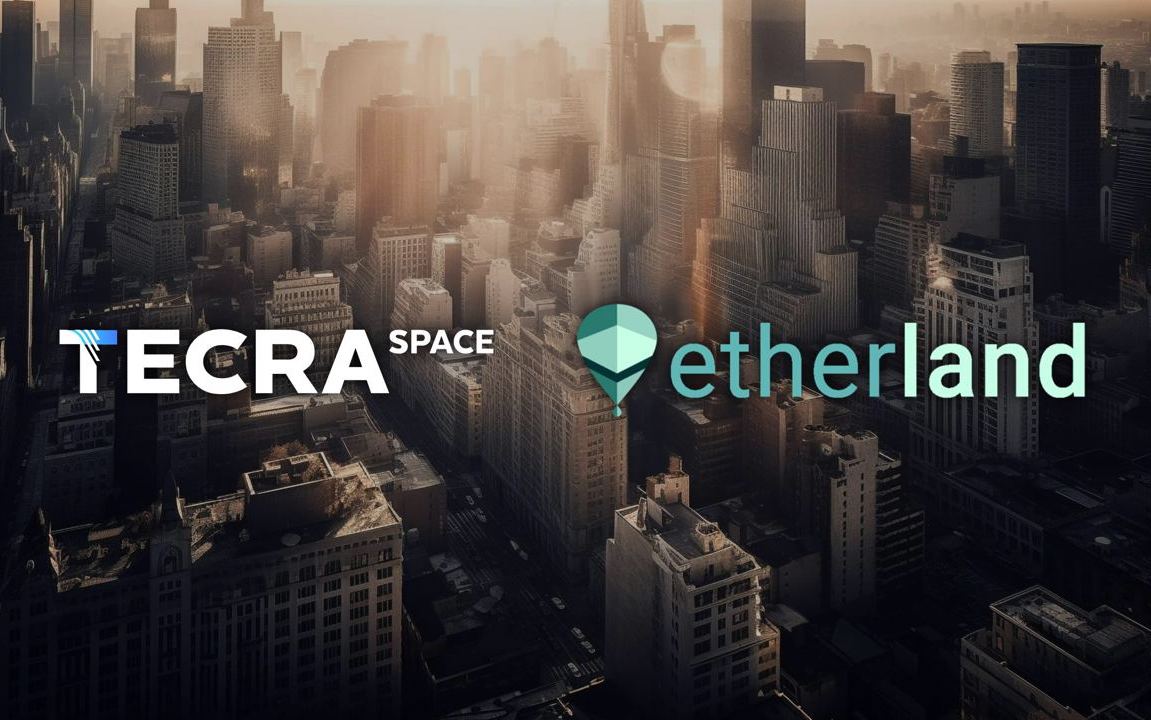
The Etherland Tecra Space campaign has officially gone live, giving participants the opportunity to stake their claim in a real-world assets (RWA) blockchain project that approaches on-chain real estate with a unique angle.
This campaign aims to accelerate the development of innovative RWA solutions powered by blockchain technology for the real estate industry. In the months leading up to the crowdfunding initiative’s launch, Etherland’s native $ELAND token has appreciated by over 300% as the project positioned itself at the forefront of the RWA narrative.
Tecra contributors will earn exclusive rewards through a tiered system offering a variety of perks based on their level of support. The Etherland team is leveraging the campaign to redefine the real estate market with document management tools powered by blockchain technology.
Etherland’s RWA Vision and the Tecra Space Campaign
The traditional real estate sector is fraught with inefficiencies, from outdated paperwork systems to reliance on intermediaries. These complexities lead to delays, increased costs, and a lack of transparency for buyers, sellers, and investors.
Etherland’s mission is to disrupt these outdated practices by harnessing the power of blockchain technology. Their focus lies in developing innovative solutions for RWAs, centered explicitly around streamlining property transactions, enhancing security, and unlocking new investment opportunities.
Funds raised through the campaign will directly fuel research, development, and expansion of essential tools and technologies. This translates into building a robust ecosystem where complex real estate processes can be simplified, creating efficiencies that benefit all stakeholders.
Etherland’s RWA solutions offer tangible benefits. Secure and tamper-proof records facilitate faster transactions with enhanced transparency, minimizing the risk of errors or disputes. New forms of asset-backed financing and real estate investment models become possible, potentially making the market more accessible.
Tiered Rewards: Earning Exclusive Perks
The Tecra Space campaign features a reward system designed to incentivize participation and recognize the contributions of supporters at different levels. Contributors can select a tier that aligns with their desired level of support, with increasingly valuable rewards unlocked at higher tiers.
Types of Rewards
The rewards offered through the Tecra Space campaign span a wide range to appeal to various interests. Every reward tier comes with a tradable NFT certificate, which gives the holder voting power in the Etherland DAO; the number of votes afforded to users increases as they move up the reward tiers.
Bonus minting credits can also be earned, which will unlock exclusive features, including staking bonuses. Top contributors are offered exclusive, limited-edition merchandise linked to especially NFTs.
Top-Tier Exclusivity
The highest tiers within the Tecra Space campaign earn rare, unreleased NFTs from Etherland’s established collections or custom NFTs designed exclusively for the campaign. Top-tier contributors are also eligible to obtain cutting-edge HoloFans, devices that enable 3D holographic displays of blockchain-linked NFTs. In addition, top-tier NFT certificates give users a particularly large number of votes in the DAO, which will make them key players in the decision-making processes driving Etherland forward.
Beyond the Rewards: Shaping the Future of Real Estate
Arguably, participation in the Tecra Space campaign offers something even more profound than rewards; it presents the opportunity to actively shape the real estate industry’s future. Every contribution helps advance real-world solutions that can potentially disrupt legacy real estate processes for the better.
By supporting this campaign, contributors become part of a community dedicated to building a more efficient, transparent, and accessible real estate ecosystem. The innovations planned by the team aim to streamline real estate transactions, enhance security measures, and unlock new investment models.
Etherland’s RWA technologies extend beyond immediate applications within the real estate sector. The platform’s focus on secure document management, tamper-proof records, and reliable asset tracking provides a solid foundation for use cases across various industries.
Therefore, contributors to the Tecra Space campaign play a pivotal role in driving innovation, which has far-reaching implications for redefining how we interact with real-world assets in real estate and other sectors.
Final Thoughts on Etherland’s Tecra Space Crowdfunding Initiative
The Tecra Space campaign launched on April 9th, marking a significant milestone in Etherland’s journey to revamp the real estate industry with blockchain-powered RWA solutions. This campaign offers the opportunity to earn exclusive rewards and become a key player in the DAO while driving innovation and shaping the future of on-chain RWAs. Become a part of Etherland’s journey by visiting the official Tecra Space page today.
News
Covalent (CQT) Announces Grants Program & API Credits for Cronos Ecosystem, Supercharging Future Web3 Innovation
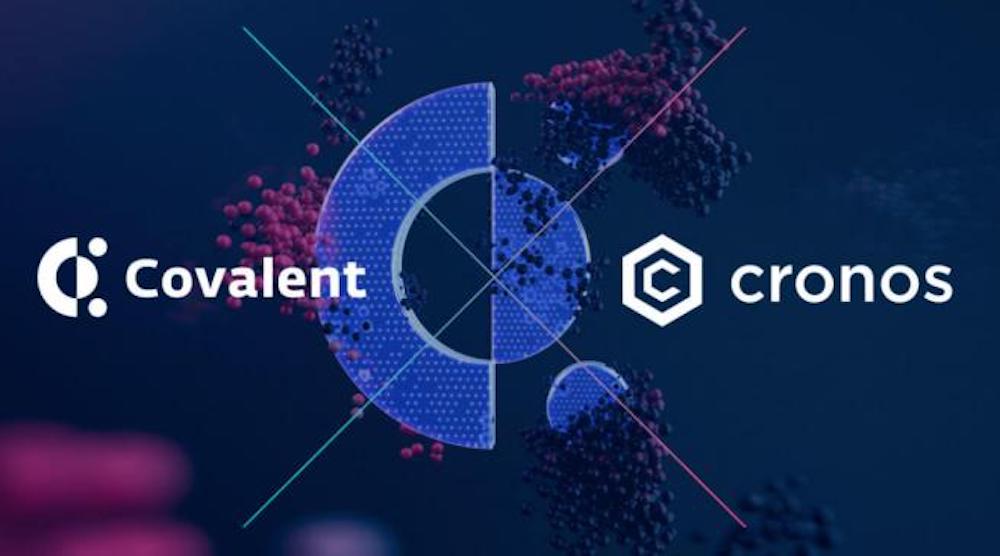
In a significant step toward fostering innovation in Web3, Covalent is excited to announce that it is extending its grants program to developers within the Cronos ecosystem. This strategic move aims to catalyze innovation and collaboration by providing support and resources to projects building on top of Covalent’s API infrastructure within the Cronos network.
Covalent stands out as an unparalleled solution for Cronos developers seeking to enhance their projects with real-time, historical onchain data. With the capacity to query data from over 100 billion decoded transactions across 225+ blockchains, Covalent’s Unified API stands as the largest and most comprehensive structured Web3 dataset. Noteworthy for its cryptographic security and adherence to enterprise-grade reliability, Covalent’s dataset further distinguishes itself by offering decentralized means of accessing Web3 data–driving innovation within the Cronos ecosystem.
Key to fostering innovations in categories including decentralized finance (DeFi), AI and machine learning, gaming, NFTs, analytics, and more, this extensive access equips Cronos developers with a fundamental foundation for innovation across a diverse array of blockchain use cases. By leveraging Covalent’s API, developers can tap into a rich reservoir of structured data that fuels their dApps, enabling them to gain valuable insights and drive innovation with confidence.
Through the Covalent API Grants program, developers within the Cronos ecosystem have the opportunity to receive expert mentorship and funding of up to $25,000 in API credits to support their projects. This financial support not only accelerates development but also fosters a dynamic ecosystem of innovative solutions on Cronos, propelling the platform’s growth and impact.
Since its launch in fall 2023, the Covalent Grants program has awarded nearly $600,000 to 40 groundbreaking projects, spanning a wide range of categories from DeFi to data analytics to security enhancements and crypto AI projects. With the largest set of verified onchain data in Web3 at their disposal, developers on Cronos have the tools they need to build and innovate with confidence.
This announcement represents a shared commitment to advancing blockchain technology and empowering developers worldwide. Through collaborative initiatives like this, Covalent and Cronos aim to democratize access to data and foster a thriving ecosystem of decentralized applications, driving the next wave of innovation in the blockchain space.
About Covalent
Covalent (CQT) is the home for Web3 data, enabling millions of users to build the new economy of products in AI, Big Data, and DeFi. Its deep commitment to democratizing access to structured data is delivered through a singular Unified API for everyone. A pillar of the DePIN ecosystem, Covalent serves developers, analysts, innovators, and 1000’s of customers with comprehensive, real-time data access to +225 blockchains and growing. Learn how Covalent is building the long-term data availability ‘Ethereum Wayback Machine’.
About Cronos
Cronos is the leading Ethereum-compatible layer 1 blockchain network built on the Cosmos SDK. Supported by Crypto.com and more than 500 app developers and partners, its mission is to make it easy and safe for the next billion crypto users to adopt Web3, with a focus on decentralized applications in the DeFi, NFTs and GameFi verticals.
Altcoins
Xuirin Finance a pioneer for DeFi card – presale stage 1 sold out
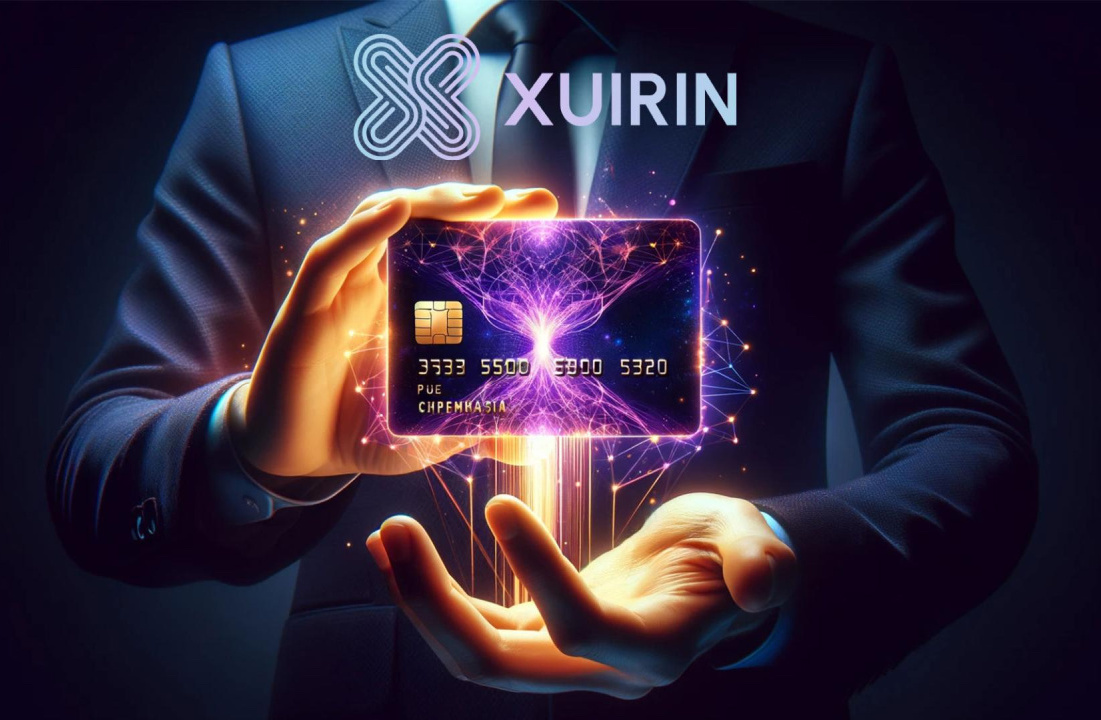
Xuirin Finance has recently presented its DeFi card, an innovative solution designed to merge the functionalities of traditional debit and credit cards with the decentralized financial services provided by DeFi. The introduction of this card aims to facilitate daily transactions using cryptocurrencies, enhancing their integration into the global payment ecosystem.
Overview of Xuirin Finance’s DeFi card
The DeFi card from Xuirin Finance allows users to engage in a variety of financial transactions, including online purchases, bill payments, and cash withdrawals at ATMs, using cryptocurrencies. This initiative is part of Xuirin Finance’s efforts to increase the accessibility and practical use of digital currencies in everyday financial activities.
Presale stages and token distribution
During the initial presale stage, Xuirin Finance offered 15 million tokens at a price of $0.03 each, reaching a funding cap of $450,000. Following the completion of Stage 1, the company is preparing for the second stage of the token presale, which involves offering 25 million tokens priced at $0.04 each, with a funding goal of $1 million.
Xuirin Finance’s $500K mega giveaway
In conjunction with its ongoing presale, Xuirin Finance has announced a Mega Giveaway, totaling $500,000 in prizes. This giveaway includes substantial rewards for 20 winners, designed to engage and expand the community around Xuirin Finance’s offerings. Participation in the giveaway requires a minimum investment in the presale, with additional engagement opportunities provided to enhance winning chances.
Key geatures of Xuirin Finance’s offerings
Xuirin Finance has integrated several features into its DeFi card, focusing on enhancing the practicality of cryptocurrencies for everyday transactions. These features include seamless online shopping, bill payments, and ATM withdrawals with digital currencies. The initiative reflects the company’s aim to improve the infrastructure supporting the broader adoption of decentralized finance technologies.
This section still highlights the value provided by Xuirin Finance, but in a way that sticks strictly to describing features without implying enthusiasm or encouraging investment.
Future outlook for Xuirin Finance
As the presale progresses and Xuirin Finance continues to enhance its services, the company is focused on broadening the practical use of cryptocurrencies in everyday financial transactions. This initiative aligns with ongoing developments in the cryptocurrency sector aimed at enhancing user accessibility and convenience.
About xuirin
xuirin Finance is a groundbreaking DeFi platform dedicated to transforming the decentralized finance landscape. With a mission to bridge the gap between traditional finance and DeFi, Xuirin introduces innovative solutions such as DeFi Debit Cards, AI-Enhanced P2P Lending, and a secure, multi-chain DeFi Wallet. Designed for accessibility and user empowerment, Xuirin aims to redefine financial transactions, making them more efficient, transparent, and inclusive.
For additional information on Xuirin Finance and to participate in the ongoing presale, users can visit:
Website: https://xuirin.com/
Linktree: https://linktr.ee/xuirin
News
Changelly surpasses 7 million users, celebrating its 9th anniversary

Changelly, a global crypto exchange platform, marks its 9th anniversary with a new milestone of over 7 million registered users worldwide. Established in 2015, Changelly has become the leading crypto exchange platform and the trusted exchange API partner for over 500 Web3 companies.
Through precise market analysis and never-ending innovation in product development, Changelly has thrived through several crypto winters and dedicated itself to developing a sustainable and secure exchange infrastructure to simplify access to crypto. Anniversaries are the best time to reflect, so the platform has presented its key achievements and future plans for the year ahead of an even bigger landmark — its 10th anniversary.
Driving a User-Centric Narrative: Expanding the Assets and Products
‘Anything to anything’ is a concept Changelly implemented within its product portfolio, offering plenty of swapping options for all popular and trending coins, blockchains, and trading pairs. Since its previous anniversary, the platform’s listing strategy has resulted in 208 new listings, marking an impressive 130% year-on-year increase.
Security is the cornerstone of Changelly’s operations across 150 markets: the company strictly adheres to security protocols and does not store user funds. While providing ease of authentication, the exchange platform pays special attention to security checks and assists users in returning stolen funds in case of hacks and fraud.
The Changelly team prioritizes the optimization of the customer experience for its core exchange product. Its mobile app helps its users swap crypto-to-crypto and fiat-to-crypto on the go at the most competitive market rates, thanks to partnerships with over 20 crypto trading platforms.
Besides, the platform is dedicated to regular updates and enhancements to its UI/UX design, ensuring it’s user-friendly for all expertise levels: the smooth usability and onboarding experience is proven by the fact that Changelly saw a growing percentage of mature audience (50+ years old).
Overall, Changelly has grown a dedicated community by educating users with the Changelly blog that provides helpful guides, an informative Crash Course, and price predictions for over 1.5M monthly readers. Meanwhile, the dedicated 24/7 live customer support reached an average response time of less than one minute and strives to help users with every issue they may face.
Harnessing Crypto Payments and Exchange API for Global Business Growth
Building a CeDeFi ecosystem, Changelly expands its product portfolio with solutions that synergistically help businesses benefit from the advantages of Web3 and blockchain with no limits and borders.
With confident leadership in its core category, Changelly, as a provider of crypto-to-crypto and fiat-to-crypto exchange APIs, has won the trust of the crypto industry leaders — Ledger, Trezor, Exodus, Tonkeeper, Tangem, and many others. For its partners’ growth, Changelly expands the variety of available assets, improves swap pricing, and offers 0% service and flexible exchange fees.
Last year, Changelly completed its ecosystem with the merchant payment solution Changelly PAY, which offers custom crypto checkouts for 80+ crypto coins and tokens with instant settlement and flexible fee management. Among other remarkable achievements in 2023, there was a launch of the fiat on-ramp API to meet the growing market demand.
Not Afraid to Face Challenges and Level Up
Speaking of the future of Changelly, its CEO Jake Cormack comments: “Our priorities are to develop our products, list new tokens across different chains, and serve users on a global scale. We are working on expanding our presence and reaching new markets with tailored offers. From the B2B perspective, Changelly will continue to grow the partner network for the exchange APIs and focus on the merchant payment gateway, on-ramp, and off-ramp solutions.”
About Changelly
Changelly is a global crypto exchange platform serving over 7 million users worldwide. Founded in 2015 and headquartered in Hong Kong, Changelly offers safe and fast crypto-to-crypto and fiat-to-crypto exchanges of over 100,000 trading pairs with 24/7 live customer support. As a CeDeFi ecosystem, Changelly provides its B2B partners with an instant exchange API, a platform for listing, and a DEX aggregator for decentralized swaps.
Business
New Collaboration: IPMB Partners with Sumsub for Enhanced Security and Customer Experience

Today Sumsub, a leading global verification provider, is pleased to announce a new collaboration with International Precious Metals Bullion (IPMB), the only truly vertically integrated token operation in the world. IPMB manages the gold supply chain from the mine to the cloud, and in the vault.
IPMB has teamed up with Sumsub to secure continuous Transaction Monitoring, Know Your Customer (KYC) and Know Your Business (KYB) checks. This collaboration will allow IPMB to ensure smooth verification processes for both individual users and legal entities, and to stay protected from digital fraud throughout the customer lifecycle.
IPMB aims to provide people and organizations with reliable, safe and secure access to gold. Utilizing a dual-token model that comprises a gold-backed hybrid payment/utility token (IPMB) and a stablecoin (GeM NFT), the company offers compliant asset-backed digital products that can be redeemed in the physical form. By integrating Sumsub’s AI-driven solutions into its ecosystem, IPMB continues to drive blockchain innovation and maintain high customer acquisition rates while thwarting fraud.
“We are thrilled to embark on this exciting journey with Sumsub, a trusted global leader in verification and fraud prevention technologies. Together, we are poised to streamline our KYC/KYB processes, ensuring seamless onboarding for our clients while fortifying our defences against fraudsters. This alliance marks a significant milestone in our mission to provide the world access to economic freedom, and we look forward to the opportunities it brings our customers and stakeholders,” says John Vakis, Founder & CEO at IPMB.
“We are excited to start our collaboration with IPMB, a future-driven tokenized gold provider,” adds Andrew Sever, co-founder and CEO of Sumsub. “Gold ownership is usually considered a very conservative industry and it is astonishing that advanced blockchain technologies now allow people across the world easy access to this kind of investment. Coupled with providing responsible gold mining and sourcing, this innovative project corresponds with Sumsub’s mission of building a safe and inclusive digital future. So we’re eager to see the results of our companies’ cooperation.”
About Sumsub
Sumsub is a full-cycle verification platform that secures the whole user journey. With Sumsub’s customizable KYC, KYB, Transaction Monitoring and Fraud Prevention solutions, you can orchestrate your verification process, welcome more customers worldwide, meet compliance requirements, reduce costs, and protect your business.
Sumsub has over 2,000 clients across the fintech, crypto, transportation, trading, e-commerce and gaming industries including Binance, Wirex, Avis, Bybit, Huobi, Unlimit, Flutter, Kaizen Gaming, and TransferGo.
About IPMB
IPMB (International Precious Metals Bullion) is a hybrid payment/utility token. The IPMB Ecosystem offers direct access to physical gold, allowing exposure to the stability of gold and the speed and security of the blockchain through a dual-token model. Through this innovation, IPMB is striving to change the gold industry forever.
IPMB vertically integrates the entire gold supply chain onto the blockchain. This allows us to optimise access, traceability and quality assurances in gold ownership. We use this solution to provide the world access to a gold-backed hybrid utility/payment token, $IPMB, and also access to the most affordable investment-grade gold on the market via our GeM NFT, a stablecoin product that waives all fees associated with modern-day gold ownership.
IPMB aims to provide the world access to economic freedom and opportunity, giving choice and control to accelerate a global transition to a low-cost, unified and transparent global currency. ‘From the mine to the vault, and in the cloud’, IPMB manages and operates physical gold production, sourcing, beneficiating, exporting, refining, stamping and vaulting of gold.
The IPMB Ecosystem is at the heart of the IPM Group, a group of companies spanning three continents and five countries.
Business
Cardano Spot & TapTools Join Hands For News & Data Sharing

Cardano Spot offers its News API to Cardano native projects for free. Meanwhile, the TapTools platform leads the data aggregation for Cardano markets.
Singapore (1st April 2024): Cardano Spot is thrilled to announce a partnership with TapTools, Cardano’s native assets data aggregator. Cardano Spot, the first Cardano Social network, strives to educate and spread awareness about the ecosystem. This collaboration focuses on bringing the latest crypto news to the community.
Enhanced Visibility
The partnership is a significant move towards fostering a better understanding of the Cardano ecosystem, using accurate data and news updates within the Cardano community. Cardano Spot and TapTools facilitate comprehensive information and data insights to empower degens.
“Cardano Spot aims to educate the community and onboard new users to the ecosystem. Our strategic partnership with TapTools will optimise our efforts to provide accurate data reporting and enhanced news articles. Our News API brings the latest updates from the Cardano blockchain and its native projects. This collaboration further complements community-generated content and brings more engagement on both platforms,” stated Anuj Chaudhary, Content Head of Cardano Spot.
“Integrating Cardano Spot’s news articles into our platform is a great step forward in spreading awareness, and we’re thankful to be working together to provide great news and updates to the community,” said James Cadena, COO & Co-Founder, TapTools.
Educational Content
The collaborative effort is to create informative content to educate the community about several aspects of Cardano’s decentralised finance (DeFi) segment. Both entities work closely with the native projects, guiding the ecosystem to the next level. TapTools has consistently demonstrated its commitment to simplifying the Cardano ecosystem, making it more accessible to users.
Mutual Collaboration
This collaboration depicts just the beginning of what promises to be a series of impactful synergies between Cardano Spot and TapTools. Both entities share a mutual goal of enriching the Cardano experience for users. Reporting on the latest developments with accurate data will help to create impactful content and research papers.
In a nutshell, the partnership between Cardano Spot and TapTools signifies a shared commitment to promoting transparency, accessibility, and education within the Cardano ecosystem. Through this collaboration, users can expect enhanced access to timely and informative content, further empowering them to engage with and understand the evolving landscape of Cardano.
About Cardano Spot
Cardano Spot is an emerging Web3 social media platform developed with the Cardano community at its core. It is a home for Cardano enthusiasts, where users can stay updated with the ecosystem. They can also grow through insights into the market and connections with the community.
About TapTools
TapTools is an all-in-one data platform for Cardano native assets. The TapTools Pro suite comes with important tools like hot wallets, wallet profiler, volume profiler pro, and distribution pro. These tools are crucial for serious investors and traders. TapTools offers personalised watchlists for tokens, wallets, and CNFTs.
For media inquiries or further information, please contact:
Mozhalova Oleksandra
PR/Marketing Manager
[email protected]
Blockchain
Swirlds Labs Brings Open Source HashioDAO Framework to the Hedera Network, Making DAO Formation Simple, Accessible, and Inclusive for All Web3 Communities

Swirlds Labs, the team providing development and support for the Hedera network, has released HashioDAO — an open-source, user-friendly interface for creating and managing decentralized autonomous organizations (DAOs) on Hedera. HashioDAO makes it easier for communities to form, govern, and operate DAOs efficiently, using Hedera’s underlying technology. It can cater to various governance needs, responding to the need for decentralized, transparent decision-making tools that diverse communities can easily adopt.
Communities looking to establish DAOs for decentralized governance have often faced extensive technical and financial complexities. HashioDAO provides an interface that simplifies the creation and management of DAOs for users, without requiring extensive technical expertise, leveraging Hedera’s enhanced security and performance capabilities. It streamlines the management of DAOs through a web app that guides users through the entire process of launching a DAO, simplifying the technical aspects while leaving decisions and control over structure, governance, and management to the DAO creators. Users will be able to access the open-source HashioDAO code directly on Github. Swirlds Labs will also offer a free, community-hosted version of HashioDAO to support adoption and ensure accessibility.
HashioDAO offers DAO creators user-friendly access to features such as customizable governance tokens, multi-sig options, and treasury management, enabling communities to easily adopt decentralized governance models suited to their specific needs. For example, HashioDAO users can adopt token/NFT-based voting and proposal creation, without needing prior technical expertise. Emphasizing transparency, inclusivity, and participation, HashioDAO will foster greater participation in decision-making processes.
Dr. Leemon Baird, Co-Founder of Hedera and Swirlds Labs, said, “Traditional decision-making mechanisms within organizations often lack transparency and are inefficient. This reduces the trust and engagement of community members. Not only that, but setting up a DAO from scratch can be a daunting task. It can be technically complex, and require a great amount of knowledge, and development resources. We will change that with the release of HashioDAO. This simplifies establishing a DAO, to make it as simple as possible, to allow any organization or community to quickly and easily create new organizations with democratic governance.”
The release of HashioDAO follows on from other free services that Swirlds Labs has brought to Hedera in the past including the HashScan ledger explorer and the Hashio JSON-RPC relay.
About Swirlds Labs
Swirlds Labs was established with the mission to accelerate the future, built on Hedera – the most used, greenest, enterprise-grade public ledger for the decentralized economy. Our vision is to enable ‘Shared Worlds’, where anyone can gather, collaborate, conduct commerce, and control their own online footprint. We will enable this vision by continuing to provide development and other support for the Hedera network, building community and enterprise solutions that enable fast, rapidly scalable adoption of Hedera network services, and cultivating ‘moonshot’ projects that will change the way humans and organizations interact in cyberspace.
-

 Blockchain3 weeks ago
Blockchain3 weeks agoIntroducing BounceBit Testnet Phase 2: App Store
-

 News3 weeks ago
News3 weeks agoL1 Blockchain XION Raises $25M to Make Crypto Disappear
-
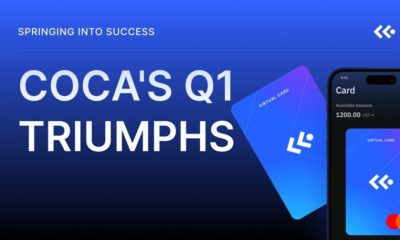
 News2 weeks ago
News2 weeks agoCOCA Celebrates 350,000 Users and a Historic 388% Growth Surge
-

 Technologies2 weeks ago
Technologies2 weeks agoWaterfall Network Launches New Desktop App for Windows and macOS
-
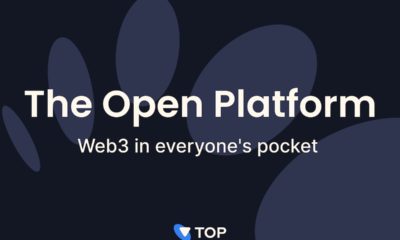
 News2 weeks ago
News2 weeks agoThe Open Platform is joining the Hong Kong Web3 Festival 2024 to accelerate Web3 development in the APAC region
-

 Blockchain2 weeks ago
Blockchain2 weeks agoICB Network Enters New Era of Blockchain Technology With Advanced Layer 1 Project
-

 Blockchain2 weeks ago
Blockchain2 weeks agoParagon Network Unveils Test Net, Showcasing Breakthrough Capabilities in Decentralized Computing
-

 Altcoins2 weeks ago
Altcoins2 weeks agoMoneyBagTrading Launches MoneyBagToken – A Gateway to Exclusive Trading Analytics


















You must be logged in to post a comment Login